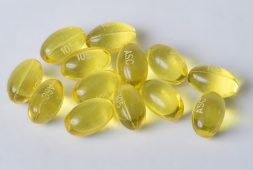
Since the beginning of the pandemic, people have been required to wear face masks out in public. For those who wear glasses, they’ve been dealing with issues such as “mask fog” on their glasses or goggles since the beginning. Their usual go-to were an antifog spray and wipe. However, experts warn those who have been doing this to reconsider. Their opinion was based on a study that was published on January 5 in Environmental Science & Technology. That’s because experts found that the four top-rated antifogging sprays and five top-rated antifogging cloths that were available on Amazon contained potentially hazardous chemicals.
“It’s disturbing to think that products people have been using on a daily basis to help keep themselves safe during the COVID-19 pandemic may be exposing them to a different risk,” shared Heather Stapleton, PhD, in a press release. She is also a coauthor of the study and a professor of environmental chemistry and health at Duke University in Durham, North Carolina.
Dr. Stapleton was, in fact, the one who had initiated the study after she took a closer look at the ingredients label on a bottle of antifogging spray that she had recently purchased for her 9-year-old daughter who needed it.
Products that Contain Potentially Hazardous PFAS
Researchers from Duke had tested out nine products, and they found eight of them didn’t even list ingredients on the label. Hence, they inspected these products and discovered that they all contained fluorotelomer alcohols (FTOHs) and fluorotelomer ethoxylates (FTEOs). These are two types of PFAS that haven’t been the subject of much scientific study. That is, until recently.
“Our tests show the sprays contain up to 20.7 milligrams of PFAS per milliliter of solution, which is a pretty high concentration,” said the lead author of the study, Nicholas Herkert. She is a postdoctoral researcher at Duke’s Nicholas School of the Environment. She shared her views in a release she recently made.
For those who are unaware of what FTOHs and FTEOs are, they are part of the chemical class known as per- and polyfluoroalkyl substances (PFAS). These are also known as “forever chemicals” because they take so long to break down in the body and in the environment. This was shared by Linda G. Kahn, MPH, PhD, a researcher and an assistant professor in the departments of pediatrics and population health at NYU Grossman School of Medicine in New York City. And while Dr. Kahn was not part of the research, she knew just how harmful these substances are.
The Byproducts of Chemicals Associated With a ‘Host of Health Problems’
“FTOHs and FTEOs break down into two types of PFAS, the perfluorooctanoic acid (PFOA) and perfluorooctane sulfonic acid (PFOS),” shared Dr. Kahn. Both of these have been linked to a variety of health issues such as low birth weight, child and adult obesity, decreased immune response, hypothyroidism, type 2 and gestational diabetes, endometriosis, polycystic ovarian syndrome, infertility, and kidney, testicular, and breast cancer, she added.
“PFOA and PFOS have raised such health concerns that they are no longer being produced in the United States and are among 200 PFAS chemicals that will be banned in Europe starting next year,” says Kahn.
Antifog Spray May Contain Metabolic Disruptors That Have an Impact on Fat Cells
It’s a fact that FTOHs and FTEOs have yet to be fully research. Because of the lack of data, scientists don’t know what the health risks are the dangers they might pose, said Herkert. According to the authors of the study, their findings point to the fact that once FTOHs have been inhaled or absorbed through the skin, they could break down in the body to PFOA or other long-lived PFAS substances, and as a fact, these are recognized as toxic.
When the authors tested the metabolic and obesogenic (the tendency to cause obesity) effects of the antifogging spray products on fat cells in a lab, they saw that exposure to it increased the number of fat cells. Plus, they also saw an increase in the amount of fat that each cell contained. This was according to Kahn.
Further Studies Required to Fully Know True Health Risks of the Substances
It must be noted that the study conducted is only the second ever to hone in on FTEOs. They also only used a small sample size. Hence, further research is much needed to deeper explore the initial findings made. The authors were all in agreement with this.
“FTOHs and FTEOs could be metabolic disrupters, but the only way to tell is through in vivo testing on whole organisms. We only did in vitro testing,” Herkert said. When they say In vitro testing, this means that they studied cells outside the body, such as in a petri dish. In vivo testing, on the other hand, looks into a living organism, such as a mouse or a human.
According to a study that was published in Reproductive Toxicology in March 2017, metabolic disruptors are considered a category of endocrine disruptors that increase the susceptibility to metabolic diseases, and when they talk of such diseases, included in the list are obesity, type 2 diabetes, and nonalcoholic fatty liver disease (NAFLD).
The endocrine system is made up of glands whose main task is to produce and secrete hormones that regulate all biological processes that happen inside the body. This work starts from birth until death. Included here is the development of the brain and nervous system, metabolism and blood sugar levels, and the growth and function of the reproductive system. This statement was made by the United States Environmental Protection Agency (EPA).
Expert Tips on How to Avoid PFAS
“Ideally, all products that contain PFAS would be clearly labeled and consumers could avoid PFAS exposure by simply reading the ingredient lists,” said Kahn. But as this study has witnessed, many products don’t list their ingredients.
Because PFAS can be found virtually everywhere and in many things, it’s not possible to completely avoid these. However, there are still ways to reduce your exposure. According to Kahn, here are some of the tips that can help you:
- Limit your use of nonstick and stain- and grease-resistant products. Use them only when truly needed.
- Limit using products that make items slippery.
- Microwaveable popcorn bags are lined with PFAS. It’s better to avoid these completely. Rather, stick to making popcorn the traditional way, as this is safer.



